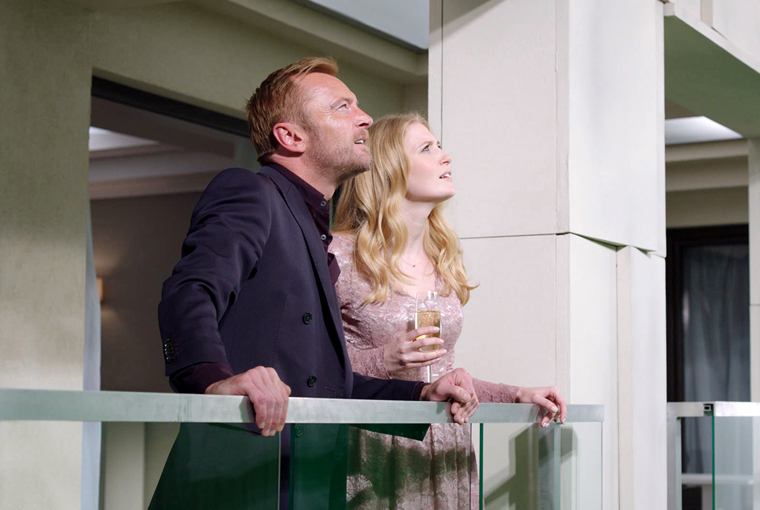Playing God
Jerzy Skolimowski’s 11 Minutes (11 minut, 2015)
Vol. 59 (November 2015) by Moritz Pfeifer
At 77, Skolimowski surely proved that he’s still up for surprises with his technically and formalistically masterful 11 Minutes, a complex exercise in hyperlink cinema, in which eleven minutes of the lives of a dozen or so people intersect in a grand finale of apocalyptic proportions. Set in contemporary Warsaw, the film’s glossy aesthetics match the jaunty lives of its characters. If they don’t live in hotels, their homes still look like luxury suits, a cosmopolitan life-style accessible even to a couple of mountaineers. Everyone seems to take part in some kind of sequestered gala of life, with CCTV providing for the habitual camera flashes. Until their lives intersect, fatally, interpersonal connections are apparently so improbable that they provoke combustion. For all its technical bravado, Skolimowski’s surveillance paranoia and cynical take on the spiritlessness of Poland’s newly rich and middle class, lacks narrative depth and thematic development, and ends up representing the very stylistically enticing, yet shallow existence of its characters.
A sleazy American film producer (Richard Dormer) meets a blond actress (Paulina Chapko) in a hotel whose jealous husband (Wojciech Mecwaldowski) desperately tries to reach her. The couple of mountain climbers (Piotr Glowacki, Agata Buzek) are watching porn some stories below, while a pedophile teacher on parole (Andrzej Chyra) is selling hot dogs on street level to lecherous nuns and pop star Ifi Ude. Somewhere else, a student (Lukasz Sikora) tries to rob a pawn shop; a drug dealer on a motorcycle (Dawid Ogrodnik) has a bad trip after having sex with the wife of one of his customers; and paramedics try to save a pregnant woman (Grazyna Blecka-Kolska) and a dying man (Janusz Chabior) in a nearby apartment whose access is blocked by a violent lunatic. All this entropy is not visible to the naked eye, however, for social decline is camouflaged by the chic of consumerist society. For those fooled by Skolimowski’s own fashion magazine aesthetics, a symbolic black spot lurks above the sky like a cancer. Clearly, society is sick and it is just a matter of time, eleven minutes for example, for it to end in disaster.
Up to this film, Skolimowski’s late bloom seemed to have resisted old-age doomsday mongering. But 11 Minutes puts him in the line of those directors who reply to social problems with fear of change, sacrificing meaningful criticism for cynical didacticism. While his Essential Killing was stylistically and thematically complex, relying on a minimalist plot to reflect on globalized terrorism and persecutory delusion, 11 Minutes’ overcoded set-up seems like a trip back to the 1990s. And while the intentions of his fatal denouement are first and foremost metaphorical, there’s definitely some cathartic celebration in it: let everyone die for things to get better. This awkwardly Catholic fantasy is at odds with the matter-of-fact vision running through the director’s oeuvre. If Skolimowski’s characters can be faulted for pursuing petty selfish goals, one wonders what the director would think about his own attempts at playing God.




Leave a Comment